Image
Introduction
A tumultuous legend
The love story between "Duga" and the Girondins is a lifelong affair. Like all good love stories it's had its ups and downs, but the passion remains undimmed.Contenu
Corps de texte
Even as a child - or from the time he joined the Girondins Academy, depending on who's telling the story - it was clear that "little" Chris was gifted. Very gifted, in fact. But the same could be said of so many young players scouted and drafted into the youth set-up. Dugarry, however, stood out from the bunch. The youngster from local club U.S. Lormont had something special, a raw talent which created an indescribable sense of excitement whenever he played. Dugarry was the sort of rough diamond who would have even the most seasoned scout struggling to contain their enthusiasm, leaving his coaches with the unshakeable conviction that this kid would one day become one of the finest footballers on the planet...
Titre
The Claude Bez days
Heading
Titre 2
Corps de texte
Born in 1972, just over a year after his brother David (himself a very talented footballer), Christophe was a striker capable of playing in midfield. It didn't take long for him to catch the eye of the scouts from the Girondins de Bordeaux FC, his prestigious hometown club. Christophe was soon signed up by the Girondins, leaving behind the right bank town of Lormont for bigger things on the other side of the Garonne. It was to be the start of an incredible adventure.
The timing couldn't have been better for the young Christophe, as he arrived at the club in the midst of Claude Bez's ambitious reign, a time when the club was riding high in the league and in terms of its financial capacities. At the age of 16, this slight figure set Le Haillan alight with his incredible technical abilities. He also exasperated his coaches at times, with a certain nonchalance which is part and parcel of growing up… But when he had the ball at his feet, "Duga" could do no wrong. Unless you had to play against him - that was a different story! His potential did not go unnoticed by the national set-up either, and Christophe represented France in all of the junior age categories, with an impressive goal/match ratio. "Little" Christophe was not so little anymore (188cm, 78kg), and within a year of joining the club he was officially drafted into the first team squad!
Image
Image
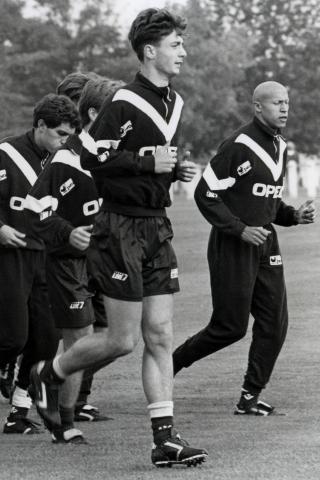
Corps de texte
His rapid rise came as no surprise to his contemporaries. Jean-Yves De Blasiis (born 1973), a multi-faceted midfielder trained at the club (and who went on to play for Bordeaux until 1996) and now a consultant for Girondins TV, remembers those days well: "Ah, Duga, when he turned up, he was just a phenomenon… Because he was just so talented, he always was! Physically, he was very tall, and for somebody of that size to be so technically gifted is rare. There was also his attitude, the way he could wind people up on the pitch! He wasn't afraid of anybody, he had a big mouth and let's just say (De Blasiis can't conceal a little smile) that sometimes caused him a few problems in the youth teams! But he never backed down. He loved to run with the ball, he'd take the hits and he'd always come back for more. I've always said that Duga was like an individual force within the team. You could say that about anybody, I suppose, but with him it was something more... What really impressed me was that he just had absolutely no fear of authority."
Titre
Debut under Couécou
Heading
Titre 2
Image
Image
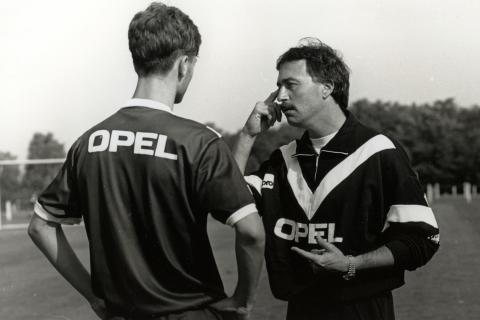
Corps de texte
Precociously talented, a whirlwind of mazy dribbles and darting runs, Duga was ready to prove himself at the highest level. He probably started dribbling round his teddy bears as soon as he learned to walk... This natural talent came as a welcome surprise to the fans. At the age of 17, Dugarry made his first team debut at the Stade Municipal on 6th May 1989 (in the 35th game of the league season), getting his first taste of D1. Didier Couécou, caretaker manager following the defenestration of Aimé Jacquet in February of that year, named him in the starting line-up. Under the watchful eye of new Technical Director (and recently retired playing legend) Alain Giresse, the young phenomenon lined up to face an A.S. Cannes side featuring Jean Fernandez (coach), Zoran Vujović, Jean-François Daniel, Félix Lacuesta, Zlatko Vujović and Antoine Martinez, all ex or future Girondins. Also in the Girondins team that day were Philippe Sence (goalkeeper), Dominique Thomas, Jean-Christophe Thouvenel, Éric Péan, Jean-Amadou Tigana, Enzo Scifo, Bernard Gimenez, Éric Cantona, Yannick Stopyra, Éric Dewilder, Marc Pascal and a certain Vincent Lizarazu1, their first professional game together. As it happens, the youngster wasn't actually supposed to feature on the team sheet that day; matchday programme Marine et Blanc actually lists Clive Allen in the squad instead of Duga… On the pitch, the two sides ground out a 0-0 draw and the newcomer was subbed off for Marc Pascal after 59 minutes. Absent from the squad for the next few games, he returned to first team action on the final day of the season against Auxerre (1-1), coming on as a sub for Thouvenel (61e). It was a season the Girondins would probably rather forget (they finished 13th, with 49 points),2 but the start of an epic adventure for Dugarry…
Titre
Reserves, Europe and Duga's first goal !
Heading
Titre 2
Corps de texte
Next season (1989-1990), upset with the team's mediocre league placing and failure to qualify for Europe, Claude Bez declared his intention to build a "solid, competitive squad" and win back Bordeaux's "rightful place." That meant no fewer than eleven new signings, including some huge names. There was little place for a promising youngster amid such giants as Klaus Allofs, William Ayache, Patrick Battiston, Joseph-Antoine Bell, Pieter Den Boer, Jean-Luc Dogon, Jean-Philippe Durand, Manfred Kaltz, Frédéric Meyrieu, Stéphane Paille and Bernard Pardo, virtually all experienced internationls. That season the Girondins finished second behind Bernard Tapie's Marseille (2nd with 51 points to OM's 53), qualifying for the UEFA Cup (C3, now known as the Europa League)! Dugarry did not feature in a single game under coach Raymond Goethals, and didn't even make the official team photo. But Bordeaux's European qualification was set to change the destiny of the young apprentice…
In 1990-1991, a number of players – including several key forwards – left the club, and new arrivals joined (or rejoined) the squad. They included Arnór Gudjohnsen, Wim Kieft (Golden Boot 1982, 32 goals scored for Ajax [A.F.C.A.]), and Philippe Fargeon, returning to the club after a first spell here from 1986 to 1988. Moreover, Dugarry still had to contend with Ferreri and Allofs, from whom he was learning his trade. Generally selected on the left wing, Duga soon began to reveal his potential. Not under Goethals, still in place until the start of the season, but under new coach Gernot Rohr who took over in August. Recently retired (May 1989) and appointed on a purely provisional basis, Rohr decided to give Duga his big break in the league. Better still, he also handed him his European debut in the UEFA Cup (in those days, only the league champion qualified for the European Cup, Europe's premier competition).
The Girondins were drawn against Northern Ireland's F.C. Glenavon, who had probably never heard the name Dugarry. But all that was about to change. The first leg, in Glenavon, ended in stalemate (0-0). Duga, spurred on by team mate Didier Deschamps, started both games but waited until the second leg (2nd October 1990, by which time Gérard Gili had been named first team coach), to score his first professional goal! In the fifth minute and on home turf, a dream come true! Ferreri added another a few minutes later (9'), sealing the first of many victories for Duga in a Bordeaux shirt. That season the Girondins' European hopes were extinguished by A.S. Roma in the next round, and they only managed a lowly 10th place finish in D1, but...
With 36 appearances (and 4 goals) in all competitions, Dugarry's career had well and truly begun…
Image
Image
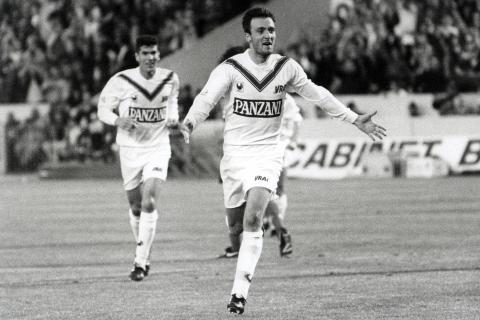
Titre
"Better than Zidane"
Heading
Titre 2
Corps de texte
In fact, all of Dugarry's European appearances for the Girondins would come in the UEFA Cup (including the old Intertoto Cup)! Dugarry never succeeded in lifting the Ligue 1 trophy with Bordeaux… But before we get to the silverware, there's a club in need of saving! When the Girondins were relegated to Division 2 as punishment for administrative misdemeanours in the summer of 1991, the club's image and credibility were at stake… Bordeaux's team of "warriors" would have to fight their way back into the top flight against some very tough opposition! Dugarry stepped up to the challenge, facing up week after week to teams looking to claim the scalp of the great Girondins de Bordeaux and teach their international stars a lesson. With Gaëtan Huard, Lizarazu, Sénac, Dogon et al. in the squad, Rohr back as manager and Alain Afflelou freshly installed as president, the season proved to be an enormous success: true to the club's spirit and values, the Girondins finished top of Group B and beatU.S. Valenciennes-Anzin to claim the title of D2 champions.
A hard-won success which put Bordeaux back where they belonged. And with 5 goals in 32 matches, Dugarry proved that he was no longer a young hopeful, but a stalwart of the team.
Gifted with superior technical abilities, Duga wowed the fans with his class and poise under pressure. He also succeeded in getting under the skin of his opponents, with his trademark feints, dummies and rapid changes of pace, all belied by his seemingly languid pace. Many of his team mates now considered him to be the "most gifted player of his generation." Which is certainly saying something when you bear in mind that Zinedine Zidane was in that same generation of Girondins...
Image
Image
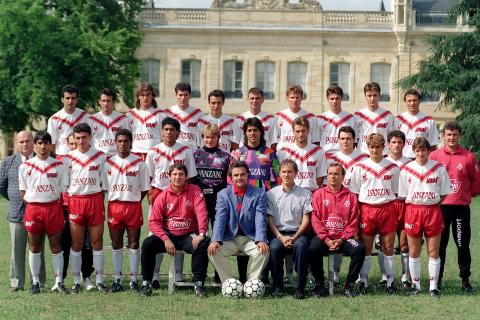
Titre
Class, elegance, goals
Heading
Titre 2
Corps de texte
Dugarry himself always seemed to embody a certain ideal of elegance and finesse, but he was also indisputably a team player. Strong in the air and also an excellent provider of crosses, he was a striker’s best friend. He was also driven, crafty – in a good way – and excellent in front of goal, qualities which soon drew the attention of the recently-appointed France boss: Aimé Jacquet. The same Aimé Jacquet who was in charge at Bordeaux when Dugarry arrived on the scene… On 26th May 1994 Duga earned his first international cap at the Kirin Cup in Japan, in a friendly against Australia. He started the game and was instrumental in the victory (1-0), launching an international career which would see him win 55 caps and score 8 goals.
Dugarry was never one to back down from confrontation on the field: he was often fouled, but didn’t always take the provocation with good humour. He often lashed out either physically or verbally, earning him a total of 58 yellow cards and 6 reds during his Girondins career. Only Marc Planus and David Jemmali received more (61 and 7 respectively)… and they were defenders !
But Dugarry was also frequently ranked among the most creative players in the league, and as Bordeaux re-established themselves as regular European contenders he continued to go from strength to strength alongside such illustrious team-mates as Lizarazu and Zidane. The latter, signed by Rolland Courbis in 1992-1993, got on wonderfully with Bordeaux “locals” Liza and Duga. Their combinations down the left flank were a major part of the Girondins’ national and European success, most notably in the epic 1995-1996 season. Having finished the season in joint 7th place with A.S. Monaco, Slavoljub Muslin’s team were obliged to cut short their holidays to play in the much-derided Intertoto Cup in July. But running out winners earned them a ticket to the Uefa Cup, and proved to be the start of an incredible run. Dugarry and Zidane got the goals in the final game which sealed qualification, against Dublin’s Bohemian F.C. (0-2).
Image
Image
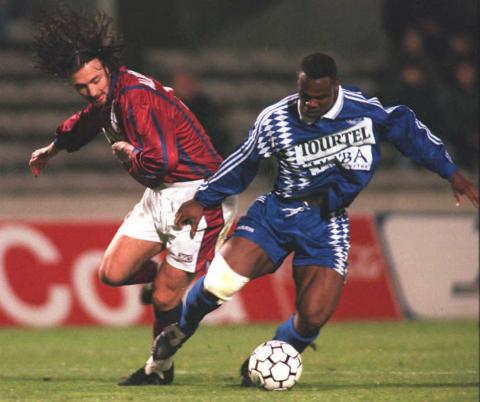
Titre
Europe at his feet
Heading
Titre 2
Corps de texte
After slipping past a Karlsruher S.C. side featuring Slaven Bilić, Thorsten Fink and Thomas Hässler (0-2 et 2-2, with a goal from Duga in the first leg), Bordeaux battled past F.K. Vardar Skopje, S.C. Rotor Volgograd and Real Betis Balompié (Seville) to set up a tie with the legendary A.C. Milan in the quarter-finals.
In February of that year Rohr had been re-appointed as manager, with Muslin given the push for his poor record in the league. Rohr knew the squad well, and the squad knew how to do the business in Europe. They were fearless, which is just as well when you’re up against a team featuring Ielpo, Costacurta, Panucci, Maldini, (Franco) Baresi, Desailly, (Roberto) Baggio, Eranio, Vieira, Savićević, (Marco) Simone, Donadoni, Di Canio (in the first leg), not to mention Weah, Albertini and (Tomas) Locatelli (second leg). A daunting array of experienced international stars and Ballon d’Or winners, coached by Fabio Capello. The first leg turned out to be a comfortable 2-0 victory for Milan, but the second leg was another matter entirely. Convinced that they were in for an easy ride, the Rossoneri were literally stunned by the talent, the pride and the determination of this famous Bordeaux side. Didier Tholot got Parc Lescure roaring with an early goal (14’), before Christophe Dugarry fired in two goals in the space of six second-half minutes (64’ and 70’). 3-0 Bordeaux, a historic night for the club! Bordeaux were the toast of Europe, and Duga had just announced his arrival at football’s top table…
Image
Image
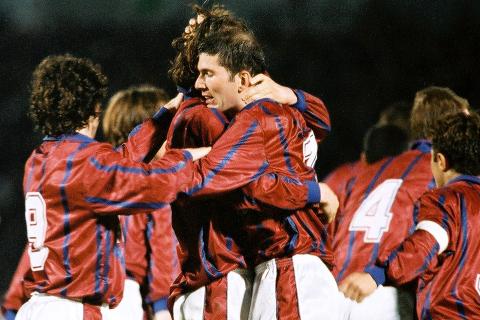
Corps de texte
Having definitively silenced any remaining doubters, the “local boy done good” and his team-mates Huard, Dogon, Friis-Hansen, Lucas, Dutuel, Grenet, Witschge, Prunier, Croci, Toyes, Bancarel and co. continued to make headway in Europe. They beat S.K. Slavia Prague in both legs of the semi-final, with Dugarry’s goal in the away leg sealing Bordeaux’s progress to the final against Franz Beckenbauer’s Bayern Munich. A momentous occasion which, alas, the “man who beat Milan” would only half enjoy. One yellow card too many meant that he missed the first leg, in Munich.3 Zidane missed the first leg for the same reason, and Bayern set themselves up with a two-goal margin which left the Girondins with a mountain to climb (2-0). The magic triangle of Zizou, Duga and Liza was back in business for the return leg, but Bayern were ruthless in their demolition of a Bordeaux side pushed to their very limits by this never-ending season of ups and downs. The home faithful were wracked with a whole variety of emotions: pride, anger, regret, frustration. It was a bitter pill to swallow, but the achievement was immense nonetheless. Bordeaux’s biggest stars were now international names, and offers were pouring in from far and wide. Rohr decided to hand debut appearances to a bunch of youngsters from the academy on the final day of the season, a 2-0 away victory over Lille which featured none of the famous triangle. Despite their European heroics, Bordeaux only just clung on to their top flight status by finishing 16th in the league. It was time for Christophe Dugarry and friends to move on to pastures new…
Titre
Departure, comeback, silverware at last
Heading
Titre 2
Corps de texte
After their incredible European performances, the Girondins squad was decimated in the summer of 1996: Dugarry was snapped up by A.C. Milan, Zidane went to Juventus and Lizarazu signed for Bilbao, while many of their team-mates also moved on. Duga’s time in Milan was to be short but sweet! Competition for places was intense in that famous Milan side, and despite some promising performances and a good few goals Dugarry never quite established himself. Keen to play more regularly (and win some silverware in the process), he opted for a move to Barcelona the following season. But the intricate playing philosophy of the Catalan coaches was not to Dugarry’s liking, and he felt stifled in his new role as defensive midfielder. After a disappointing season he returned to France and l’Olympique de Marseille, determined to push for the L1 title. But that season OM finished second in the league by just one point… behind Bordeaux! A frustrating season for Marseille also saw them reach the final of the UEFA Cup, only to lose 3-0 to Parma. Once again, Dugarry was suspended for the final.
Image
Image
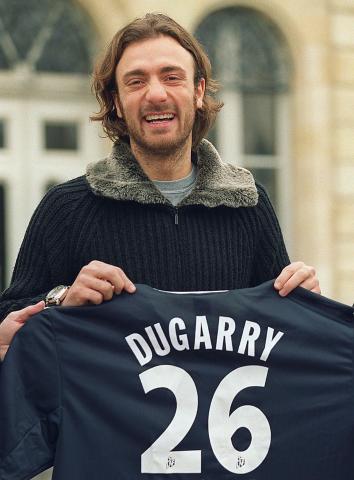
Corps de texte
After a brief stay down on the Mediterranean coast, Dugarry was lured back to the Girondins. He returned as a World Cup winner, determined to write a new page in the history of his boyhood club. His hair was longer, but something else had changed too: Duga’s playful character seemed to have deserted him. Nonchalant, provocative, sometimes cynical, his perceived diving earned him the nickname “Dugrass.” Some Bordeaux fans had trouble recognising their former favourite. But in spite of all the inconsistencies his fundamental qualities remained undeniable: strong in the air, and a prolific creator of chances. But his scoring record was slipping, and the frustration appeared to be getting to him. He was a thorn in the side of the refereeing profession, and often at odds with the crowd (even in Bordeaux). The press certainly did him no favours… Rebellious though he may have been, he nonetheless captained a Bordeaux side featuring (Frédéric) Roux, Jemmali, Bonnissel, Roche, Smertin, Dhorasso, Meriem and Pauleta to victory in the league cup. The Girondins walked over F.C. Lorient 3-0 in the final, with Duga providing an assist for Pauleta.
Image
Image
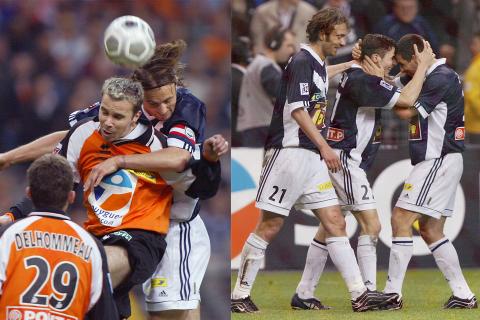
Corps de texte
Lifting a trophy as Bordeaux captain was a dream come true, but that dream was soon to end. In December of that year, it all came tumbling down during a European tie in Anderlecht. Often at odds with the new generation of players coming into the team, Duga got into a locker room fight with team-mate Eduardo Costa (ten years his junior). Despite having three years left to run on his contract, Dugarry quit on the spot. He soon signed for Premier League side Birmingham City, where he was probably the club’s best player in the years 2002-2004. He ended his career with a brief victory lap with Qatar S.C. (2004-2005), before moving on to a career as a TV pundit and talk radio host whose expertise and straight-talking have made him a big hit with audiences and critics alike. Even if, on occasion, his generous nature, honesty and spontaneity may lead him to make certain errors of judgement…
“Pain in the backside” to some, virtuoso or misunderstood genius to others (the two are not mutually exclusive), Christophe Dugarry always provoked strong reactions. He made a total of 324 appearances for Bordeaux, scoring 63 goals (including 4 braces) in all competitions and playing a major part in some of the club’s finest moments. His immense talent was too often overshadowed by unfortunate circumstances, the odd misplaced comment and his hard-headed character, with consequences for his career on the pitch. But whatever he might say, Dugarry has a profound love for the Girondins de Bordeaux. Just as well really, since here in Bordeaux we love him too…
Image
Image
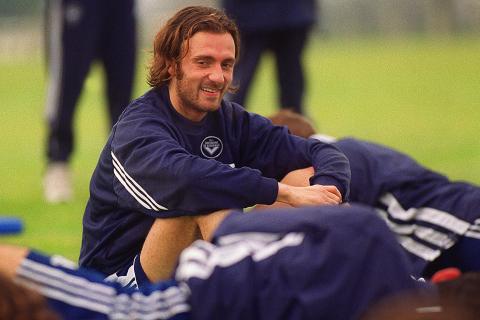
Corps de texte
1. Vincent Lizarazu is none other than Bixente Lizarazu, still using the French spelling of his name at that time. « Liza » made his professional debut for Bordeaux in the Autumn of 1988 against S.M. Caennais, in Normandy (a 3-0 defeat). A full six months before his friend Christophe Dugarry got his first call-up.
2. The Girondins squad in 1988-1989 also featured Didier Sénac, Alain Roche, Gernot Rohr, Jesper Olsen, Jean-Marc Ferreri, Bernard Genghini, Clive Allen, Jean-Luc Gautier and Jérôme Gnako.
3. In 1995-1996 the UEFA Cup (C3, today's Europa League) final was still played over two legs, unlike the other two European competitions (the European Cup/Champions League and the Cup Winners' Cup). From 1997 onwards the final became a one-off fixture played on neutral ground.
Libellé
Record with the Girondins and France
Corps de texte
> Division 2 Champions 1992
> Coupe de la Ligue 2002
> Intertoto Cup 1995
> UEFA Cup runner-up 1996
> World Cup 1998
> Euro 2000
> Confederations Cup 2001
> 55 caps, 8 goals
Background Section Club
Activé